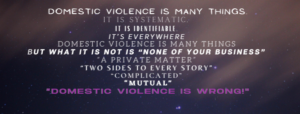Domestic violence is many things but what it is not is
“None of your business”!
Communities, families, society have to STOP ignoring domestic violence.
We have to stop pretending it is not our problem.
Domestic Violence is WRONG!
We have to stop treating it as a personal issue, a family issue, or a women’s issue and start acknowledging that domestic violence affects everyone. 1 in every 3 women and 1 in every 7 men are in an abusive relationship at some point in their life. These statistics mean that it happens to anyone and affects everyone. It’s highly likely that you or someone you know has experienced domestic violence.
Domestic violence isn’t just a slap, a hit, a broken bone, or a black eye. Physical abuse is only one form of domestic abuse. Many domestic violence victims suffer multiple forms of abuse which include physical, mental, emotional, financial, and sexual abuse.
Domestic Violence, and the combinations of different forms of abuse, slowly erodes the self-esteem of victims. Most victims feel alone or confused as a result of the abuse. They may feel as if they have nowhere to turn.
Together we can end domestic violence! But how?
The first step to stop domestic violence is to STOP victim-blaming!
Stop asking victims why they stayed! Stop blaming the victim and start blaming the abuser! Stop supporting the abuser and start supporting the victim.
In order to support someone who is in an abusive relationship, we need to build victims up and support them to develop their own conclusions and leave when they’re ready.
How to build up and support them:
- Believe them! Many abusers are both physically and psychologically abusive; manipulative and controlling to their victims. This manipulation often extends to people outside the relationship. The abuser may seem charismatic and lovable, they may even convince outsiders that the victim is to blame for problems in the relationship. People who don’t know what they’re looking at will say, ‘there’s always two sides to every story.’ But a perpetrator of abuse will twist the story to maintain control. When someone tells you about abuse, the number one thing you can do is believe them.
- Be patient. It’s not easy to leave an abusive relationship. On average it takes a victim 7 attempts to successfully escape. Remember the victim may not feel safe leaving and they likely have feelings of guilt and shame caused by years of manipulation and control. An abuser can make it feel like it is the victim’s fault that all of the abuse is happening. It can be really difficult when someone you know and love is in an abusive relationship. Don’t take it personally if they don’t leave when you think they should. Remember, leaving is not an act but a series of acts.
- Prepare a safety plan. Instead of insisting a victim leaves their abusive situation, help them in preparing a safety plan. This important step can help someone feel safe to leave when they’re ready. Domestic violence advocates at Bright Horizons can help victims develop safety plans but, sometimes reaching out to a stranger alone seems like an insurmountable task. Offer to go with your friend or loved one when they visit with an advocate. They will appreciate your support!
- Be the opposite of the abuser. When someone has had their power and control taken away, they need to be shown what real love looks like and how they should be treated. You can play a key part in restoring their self-value. Combat the untruths, the myths, and the manipulations with truths about the situation. Talk about what real love actually is. Abuse, taking power and control over another individual, is not love! Do not try to assert your power and control over a victim to get them to leave, they already have someone controlling them. Instead just love and support them. With a lot of love and support, they will eventually be able to leave. Once they have left continue to show them love and support, leaving is the first step in healing not the last!
For more information on how to build up and support a victim of domestic violence contact one of our advocates. We have offices located in Norfolk, O’Neill, and Ainsworth.
If you are in (or have been in) an abusive relationship please call us! Bright Horizons offers resources and supports for victims and survivors regardless of where you are in your recovery journey. We can help you stay safe until you are ready to leave and we can help you recover and thrive after you have left.

